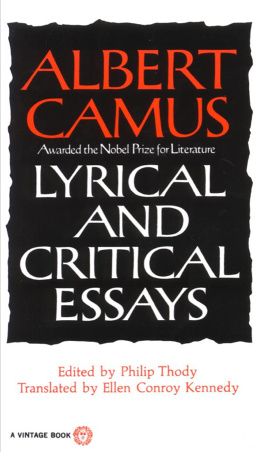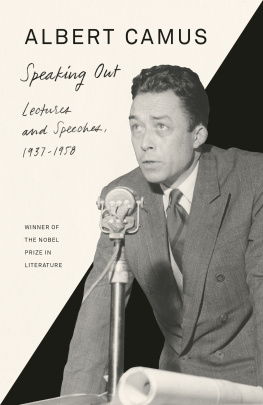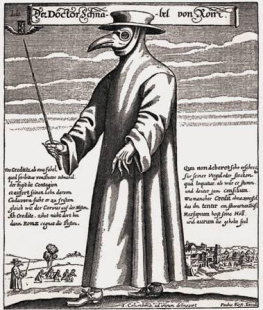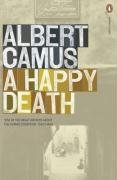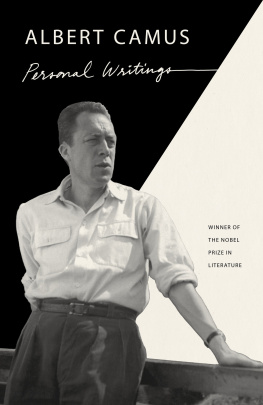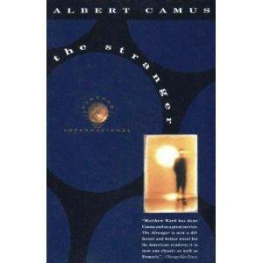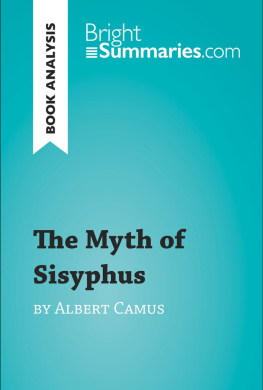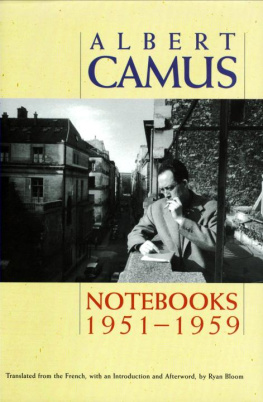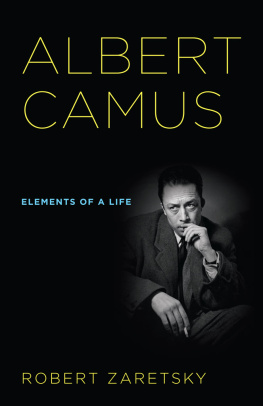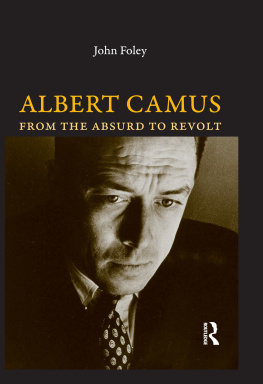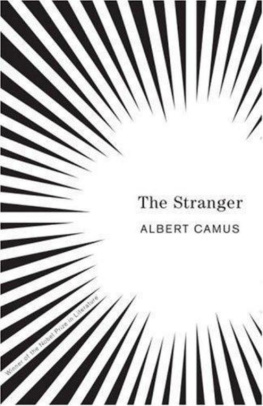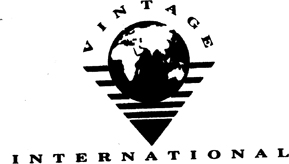A LBERT C AMUS was born in Algeria in 1913. He spent the early years of his life in North Africa, where he became a journalist, and from 1935 to 1938 he ran the Thtre de lquipe, a company that produced plays by Malraux, Gide, Synge, Dostoyevsky, and others. During World War II he was one of the leading writers of the French Resistance and editor of Combat, an underground newspaper he helped found. His fiction, including The Stranger, The Plague, The Fall, and Exile and the Kingdom; his philosophical essays, The Myth of Sisyphus and The Rebel; and his plays have assured his preeminent position in modern letters. In 1957, Camus was awarded the Nobel Prize for Literature. Upon his untimely death in a road accident in 1960, Jean-Paul Sartre wrote, Camus could never cease to be one of the principal forces in our cultural domain, nor to represent, in his own way, the history of France and this century.
ALSO BY
Albert Camus
Winner of the Nobel Prize for Literature
THE FIRST MAN
In The First Man Albert Camus tells the story of Jacques Cormery, a boy who lived a life much like Camus own. Camus summons up the sights, sounds, and textures of a childhood circumscribed by poverty and a fathers death yet redeemed by the austere beauty of Algeria and the boys attachment to his nearly deaf-mute mother. The result is a moving journey through the lost landscape of youth that also discloses the wellsprings of Camus aesthetic powers and moral vision. Published thirty-five years after its discovery amid the wreckage of the car accident that killed its author, The First Man is the brilliant consummation of the life and work of one of the twentieth centurys greatest novelists.
Fiction/Literature
EXILE AND THE KINGDOM
From a variety of masterfully rendered perspectives, these six stories depict people at painful odds with the world around them. A wife can only surrender to a desert night by betraying her husband. An artist struggles to honor his own aspirations as well as societys expectations of him. A missionary brutally converted to the worship of a tribal fetish is left with but an echo of his identity. Whether set in North Africa, Paris, or Brazil, the stories in Exile and the Kingdom are probing portraits of spiritual exile and mans perpetual search for an inner kingdom in which to be reborn. They display Camus at the height of his powers.
Fiction/Literature
THE FALL
Mordant, brilliant, elegantly styled, The Fall is a novel of the conscience of modern man in the face of evil. In a seedy bar in Amsterdam, Clamence, an expatriate Frenchman, indulges in a calculated confession. He recalls his past life as a respected Parisian lawyer, a champion of noble causes, and, privately, a libertineyet one apparently immune to judgment. As his narrative unfolds, ambiguities amass; every triumph reveals a failure, every motive a hidden treachery. The irony of his recital anticipates his downfalland implicates us all.
Fiction/Literature
A HAPPY DEATH
In his first novel, A Happy Death, written when he was in his early twenties and retrieved from his private papers following his death in 1960, Albert Camus laid the foundation for the The Stranger, focusing in both works on an Algerian clerk who kills a man in cold blood. But he also revealed himself to an extent that he never did in his later fiction. For if A Happy Death is the study of a rule-bound being shattering the fetters of his existence, it is also a remarkably candid portrait of its author as a young man.
Fiction/Literature
THE MYTH OF SISYPHUS AND OTHER ESSAYS
One of the most influential works of this century, The Myth of Sisyphus and Other Essays is a crucial exposition of existential thought. Influenced by works such as Don Juan and the novels of Kafka, these essays begin with a meditation on suicide: the question of living or not living in a universe devoid of order or meaning. With lyric eloquence, Albert Camus brilliantly posits a way out of despair, reaffirming the value of personal existence, and the possibility of life lived with dignity and authenticity.
Nonfiction/Literature
THE PLAGUE
A gripping tale of unrelieved horror, of survival and resilience, and of the ways in which humankind confronts death, The Plague is at once a masterfully crafted novel, eloquently understated and epic in scope, and a parable of ageless moral resonance profoundly relevant to our times. In Oran, a coastal town in North Africa, the plague begins as a series of portents, unheeded by the people. It gradually becomes an omnipresent reality, obliterating all traces of the past and driving its victims to almost unearthly extremes of suffering, madness, and compassion.
Fiction/Literature
THE REBEL
For Albert Camus, the urge to revolt is one of the essential dimensions of human nature, manifested in mans timeless Promethean struggle against the conditions of his existence, as well as the popular uprisings against established orders throughout history. And yet, with an eye toward the French Revolution and its regicides and deicides, he shows how inevitably the course of revolution leads to tyranny. As old regimes throughout the world collapse, The Rebel resonates as an ardent, eloquent, and supremely rational voice of conscience for our tumultuous times.
Nonfiction/Literature
RESISTANCE, REBELLION, AND DEATH
Resistance, Rebellion, and Death displays Camus rigorous moral intelligence addressing issues that range from colonial warfare in Algeria to the social cancer of capital punishment. But this stirring book is above all a reflection on the problem of freedom, and, as such, belongs in the same tradition as the works that gave Camus his reputation as the conscience of our century: The Stranger, The Rebel, and The Myth of Sisyphus.
Fiction/Literature

Available wherever books are sold.
www.randomhouse.com
Preface, 1958
The essays collected in this volume were written in 1935 and 1936 (I was then twenty-two) and published a year later in Algeria in a very limited edition. This edition has been unobtainable for a long time and I have always refused to have The Wrong Side and the Right Side reprinted.
There are no mysterious reasons for my stubbornness. I reject nothing of what these writings express, but their form has always seemed clumsy to me. The prejudices on art I cherish in spite of myself (I shall explain them further on) kept me for a long time from considering their republication. A great vanity, it would seem, leading one to suppose that my other writings satisfy every standard. Need I say this isnt so? I am only more aware of the inadequacies in The Wrong Side and the Right Side than of those in my other work. How can I explain this except by admitting that these inadequacies concern and reveal the subject closest to my heart. The question of its literary value settled, then, I can confess that for me this little book has considerable value as testimony. I say for me, since it is to me that it reveals and from me that it demands a fidelity whose depth and difficulties I alone can know. I should like to try to explain why.

